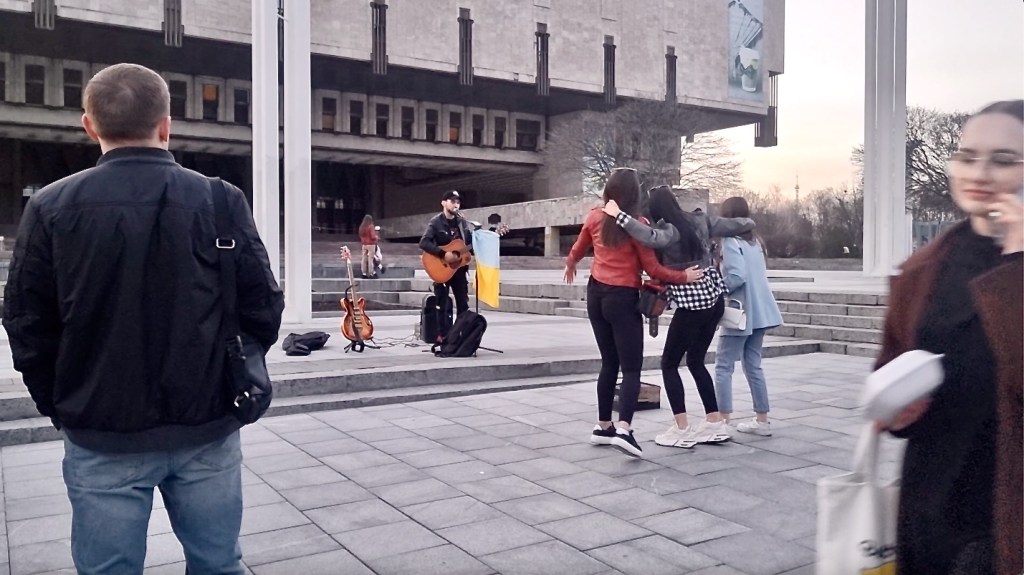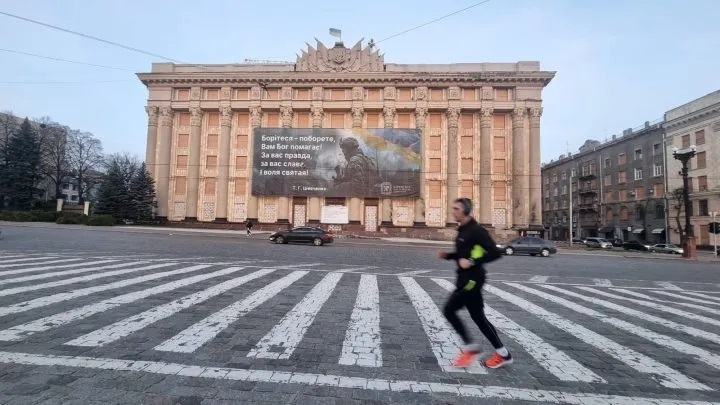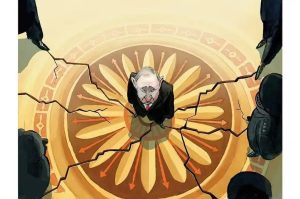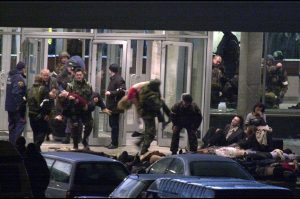Fifty-three-year old Irina Kotenko was already awake when a Russian drone crashed into the roof of her three-story building at 1 a.m. last Thursday. She had heard another strike nearby and was wondering where it might have hit. The explosion blew out the windows of her home. Somehow Irina, her husband, Vitaly, forty-eight, and her daughter Aleksandra, twenty-one, survived unscathed. Aleksandra began to shout: “Mom, are you alive?”
In the next-door apartment a neighbor, an older man who lived alone, was buried in rubble. Soon emergency workers arrived. Outside firemen poured water on to the roof of the building to put out a fire that had broken out.
These days little in Kharkiv is truly safe
It was then that another attack drone hit the asphalt just outside the house, in what is known as a “double tap.” It is a technique usually used by terrorist organizations and is designed to kill and maim rescue workers.
The brutal tactic worked. Three rescue workers died. One of them was a fifty-two-year-old fireman whose son was helping put out another fire caused by a drone attack nearby. Heartbreaking scenes were shown on Ukrainian social media channels of the son breaking down when he was told the news. “Nobody expected this tactic,” a rescue worker I spoke to at the scene said. “It’s barbaric.”
The attack on Irina’s house was one of three last Thursday in Kharkiv that left four people dead and many more injured. Then early on Saturday another seven people were killed in the city by Russian drones and missiles.
Kharkiv, Ukraine’s second city, is now seeing some of the worst death counts since the early days of the war when a ferocious Russian attack in May 2022 left around 600 residents dead. Meanwhile there are rumors that Moscow, which is now on the front foot in its war against Ukraine, may make a new effort to try and storm the city later this year. It would certainly be a major prize. President Vladimir Putin hasn’t succeeded in occupying and holding a major Ukrainian city since his forces destroyed much of Mariupol in southern Ukraine at the beginning of the war before overrunning it.
I spent several days in Kharkiv last week. It was a strange experience. Most days you fall asleep and wake up to an air raid warning. There are two versions: a mournful, melodious municipal siren, and an unpleasant braying app you can install on your phone.
With the Russian border a mere twenty-four miles away, the alert, however delivered, gives precious little warning of attack. In some cases there is only thirty seconds to react, barely enough time to make it to the bathroom, let alone a proper bomb shelter.
So many locals don’t even bother. Last weekend, after a Russian attack on part of the local energy infrastructure, the city’s mayor urged all residents to stay in shelters. But outside on the streets life continued as normal, cars queued at intersections (though the traffic lights were out) and pedestrians strolled unhurriedly among the many bomb-damaged buildings in the city center.
“Life has to go on,” said Yulia, a thirty-three-year-old single mother working in a city center café. “I’m an optimist and, though not all my friends agree with me, I think the war can’t go on forever. In the meantime we have to live.”
As I walked around the city and the air raid alerts came and went even a local playground was busy. Kids ranging from toddlers to teenagers clambered on climbing frames, or rocked themselves backwards and forwards on swings. Only a simple hand-written inscription propped up against a statue dedicated to the youth of the city served as a warning. Two dozen cuddly toys had been placed alongside rows of small candles. “Russia killed them,” it read.
These days little in Kharkiv is truly safe. One recent Russian strike hit a fuel depot and, as the burning liquid flowed down a nearby street, it set fire to everything in its path incinerating two families, including several children. Two of the large hotels in town have been hit by missiles in recent weeks. Even so, more than two years into the war, there are still an estimated 1.2 million people living in this city. Most are defiant and have learned to adapt.
Five of the city’s metro stations now have temporary primary schools operating in them. In a sign that the authorities recognize that the war might not end any time soon there are plans to build an entire underground school. “The children are used to war by now,” said Elena, a forty-three-year-old businesswoman. “If it was left to them they would happily walk around without fear. But of course we have to protect them.”
Surprisingly perhaps, there is even a degree of optimism in Kharkiv. A recent opinion survey said that 90 percent of residents still believe that Ukraine will win the war, as long as the West continues to provide weapons. Around 60 percent said they were happy, even if most said they had suffered physical or mental hardship because of the war and many had lost relatives.

One of the reasons that Kharkiv residents give for their strength and defiance is a unifying hatred of Putin and the Russians. But another, locals say, is that there is a strong network of psychological support provided by volunteers. Posters in the city direct residents to toll-free numbers they can call to discuss their fears and anxiety. “Psychological support really helps,” one Ukrainian told me.
And for those who have just had enough and need to vent, a radio station has been set up. Its name translates as “Boiling Over” or “Fed Up.” The authorities have given the station a local FM frequency that was once home to a Russian propaganda channel. Locals are invited to call into the program. Some complain about local bureaucracy, but most fulminate against the Russians.
Whatever the reasons, one thing that strikes an outsider is the remarkable resilience of Kharkiv residents. As I talked to Irina, dozens of rescue workers and volunteers were at work. Some were putting chipboard over broken windows, others were collecting downed electrical cables on spools. A group of older ladies were raking debris from the grass and sweeping up with brooms.
When a new air raid alarm went off, all continued to work, ignoring the threat. A few minutes later we heard another explosion, this time in the distance. It was yet another drone attack. And caused yet another death. This time the victim was a man working in the fields. “This is my native city,” Irina said. “I really don’t intend to leave.”
This article was originally published on The Spectator’s UK website.


























Leave a Reply